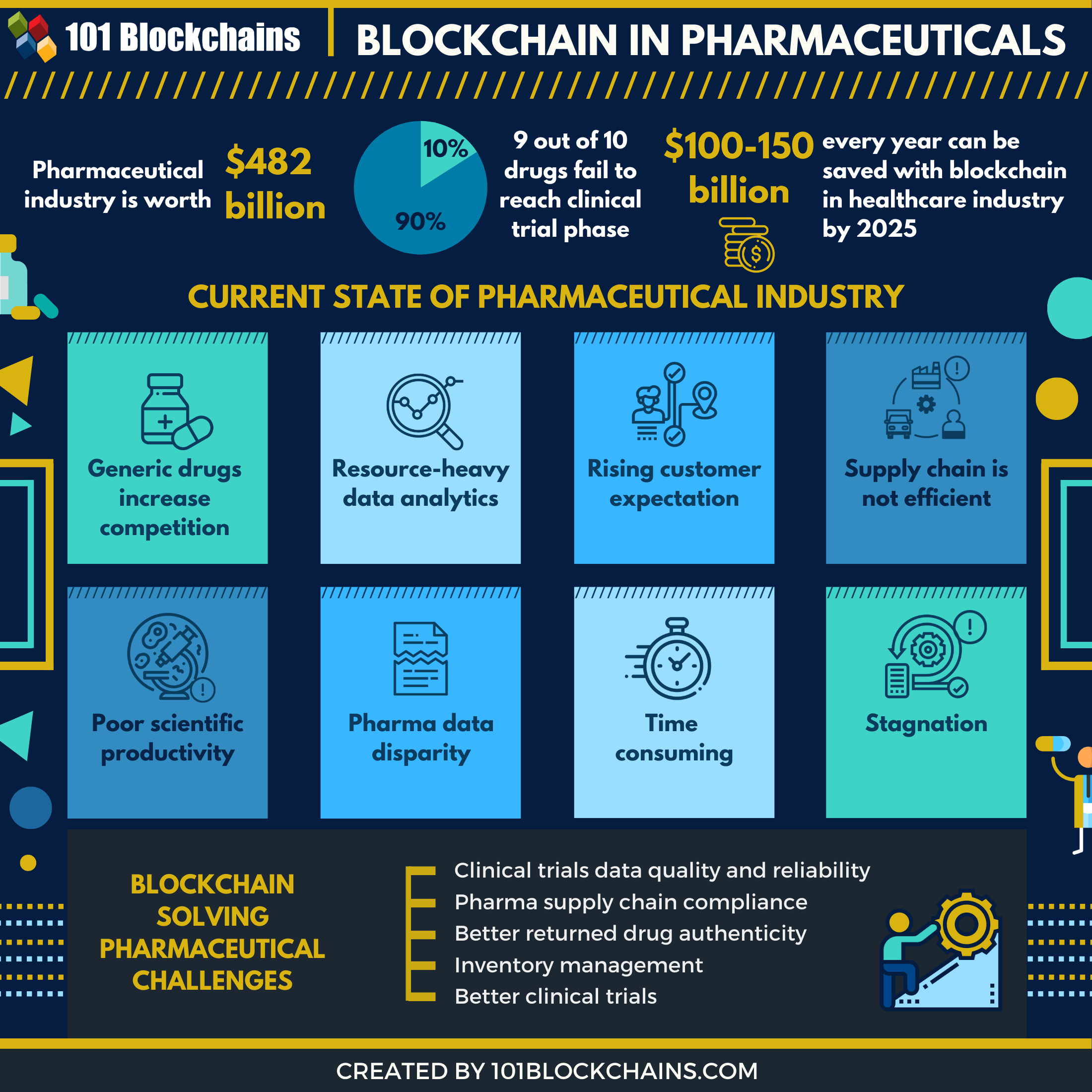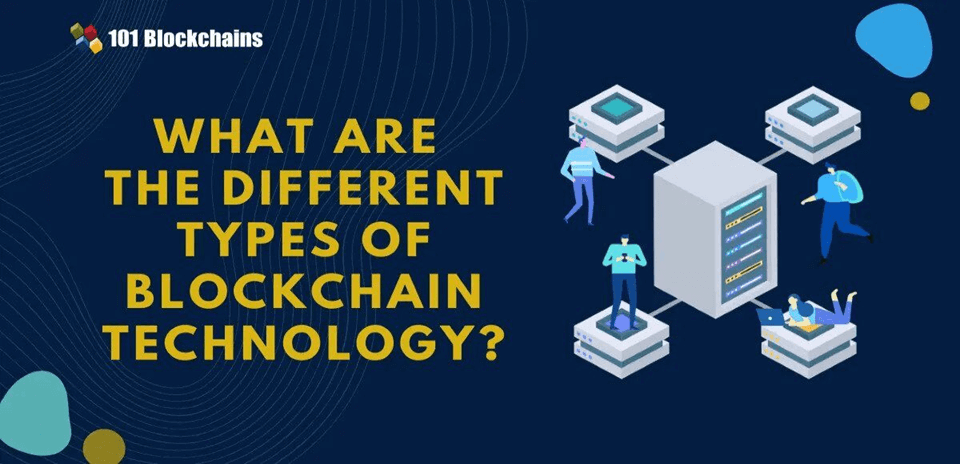Learn how blockchain truly works, master key definitions, and uncover what makes smart contracts so "smart." Dive into the fundamentals, gain valuable insights, and start your blockchain journey today!

- Reviews
Gwyneth Iredale
- on January 03, 2021
Blockchain In Pharma: Will Pharmaceutical Industry Evolve?
Do you think whether blockchain in pharma will work or not? Here, we are going to discuss blockchain in pharmaceuticals and its role in improving the technology surrounding it.
With healthcare being the number one topic around the world, pharmacy plays a crucial role in attaining the goals.
Blockchain is almost a decade old. Its presence has been felt in nearly every sector out there. It is highly applicable to different use-cases ranging from financial services to real estate. The winner here is the companies who are using it to improve their processes.
The impact of blockchain can be gauged because it will help the healthcare industry save $100-$150 billion per year. These numbers should take effect by 2025. The savings can be seen in the operational cost, personnel cost, support functions costs, counterfeit, and so on! Blockchain and pharma, both together, can go a long way!
Not sure how to build a career in enterprise blockchain? Enroll Now: How to Build Your Career in Enterprise Blockchains
Blockchain In Pharma: The Current State of the Pharmaceutical Industry
The pharmaceutical industry is a critical part of healthcare. It is a $482 billion industry. Without it, there would be no drug development, distribution, or discovery. When we speak of the pharmaceutical sector, we mean these three things: distribution, development, and discovery process.
Right now, the pharmaceutical industry is not in good condition. The fact that 9 out of the 10 drugs fail to reach the clinical trial phase speaks volumes on its condition. This also means that rarely a new drug rarely reaches the FDA approval process. All of these mostly happen because of a lack of patient data, on which the pharma companies base their research and approval process.
To better understand the pharma industry, let’s take a quick look at the challenges.
Please include attribution to 101blockchains.com with this graphic. <a href='https://101blockchains.com/blockchain-infographics/'> <img src='https://101blockchains.com/wp-content/uploads/2020/02/blockchain-In-Pharmaceuticals.png' alt='blockchain In Pharmaceuticals='0' /> </a>
Pharma Data Disparity
At the core of the pharma industry is the data as it allows them to experiment, understand, and innovate new drugs for different diseases. Pharmaceutical companies always find data disparity a big problem when trying to solve particular diseases. This data disparity comes from the silos that store the data. The silos work by connecting to different platforms.
The dependence on different sources and the inability to verify the data uploaded and shared makes the data disparity a real problem. The data disparity also comes due to the use of different data structures and models used by the data sources and departments.
Generic Drugs Increased Competition
There has been increased competition from generic drugs. The reason behind the FDA’s decision to release low-cost generic drugs to the market in a smoother and faster way.
This makes it hard for new drugs to get approved. New drugs generally have a 180-day period of exclusivity. But generic applications backlog is huge and hence makes the exclusivity principle hard to maintain.
Also Read: Blockchain Definition: The Real Meaning of Blockchain Technology
Rising Customer Expectation
With each passing day, customers are getting smarter and more knowledgeable. Their demands as a customer are getting more and more. With increased scrutinization, it is up to the pharmaceutical companies to take better steps, both economically and clinically, to provide their services that meet customer’s expectations in both poor and rich countries.
Time-Consuming and Resource-Heavy Data Analytics
As the data is accessed from different sources using different models and structures, the data analytics part becomes very time consuming and resource-heavy. The companies need first to make sure that the data they gathered is fresh and insightful before they can start doing data analysis on them.
They also need to make sure that they use ground-breaking data analytics tools to find out what they are looking for.
Supply Chain
One of the biggest challenges of the pharma industry is to maintain the supply chain. The pharma supply chain is complex and risky.
Any compromised supply chain means that the pharma company loses tons of money due to fraud and counterfeit drugs. In the global report of the healthcare market, pharmaceutical companies are set to lose around $200 billion every year due to counterfeit drugs.
Poor Scientific Productivity
In the last decade or so, the scientific community at pharma has not done anything extraordinary. The output rate has remained the same, which leads to the belief that the process of discovering and development is fundamentally flawed.
If you compare it with other research industries, then the pharma industry scientific research is nowhere compared to them.
Stagnation
The last challenge the pharma industry is suffering from is stagnation. It is because of no change in the strategies, management culture, and mental models. Everything is done in a traditional manner, which doesn’t improve any of the pharma industry’s current pain points.
Almost every industry out there has changed in terms of management culture and process. However, health care and pharmaceuticals seem to suffer from cut thought competition, which is beyond the control of many pharma competitions out there.
Read Similar Topic: How Could Blockchain Disrupt Healthcare?
Blockchain Solving Almost Every Pharma Industry Challenges and Problems
Blockchain pharmacy can go to a new kind of infrastructure if the companies start to adopt it.
Now that we have understood the challenges surrounding the pharma industry, let’s explore the solution.
Blockchain is a new technology that holds the key to all those challenges. Some challenges are beyond the capacity of blockchain; however, it does impact them indirectly.
Blockchain is a peer-to-peer solution that doesn’t need a centralized entity to function properly. It utilizes a consensus model to reach consensus for the transactions and other activities that are carried out in the network. Blockchain networks are also immutable, secure, and transparent.
Blockchain can modernize the pharma industry as it introduces three important elements in the industry: privacy, transparency, and traceability. It will help with the industry’s laws, practices, privacy, and global regulations. It can also help pharma to track and trace drugs using blockchain.
For instance, clinical trials will benefit hugely due to access to more transparency and correct information. There are other use-cases where blockchain shines, and to get a better understanding, we need to go through the key use-cases of blockchain in pharma and how it can track and trace.
If you want to read more about blockchain technology, we recommend you go through our beginner’s blockchain guide.
Blockchain Use-Cases in Pharma: Blockchain For Pharma
There are many use-cases of blockchain in pharma. Let’s go through them below.
Returned Drugs Authenticity
Pharmaceutical companies have to deal with the returned drugs periodically. This happens because of overstocking by the wholesalers. That’s why they have to return the unused stock to the manufacturers.
At any given time, 2-3% of the drugs are returned. However, when you match it with the volume of money, it can reach anywhere between 7 to 10$ billion.
But, the biggest issue is that the returns are comprised of counterfeit drugs. The pharma companies’ challenge is to identify them and then separate them before they can sell the returned drugs to the market.
To ensure that it happens, each drug needs to be barcoded and serialized.
A centralized authority does it (at least in the EU). But doing so can mean involving another vendor that controls the authentication of the drugs. In the USA, there is a lack of a centralized database regulator.
The solution is to utilize a decentralized blockchain. By doing so, the pharmaceutical manufacturers can easily record the package serial number on blockchain. This means that the drug can be verified from anywhere. Blockchain pharmacy is the start of a new era.
It gives the customers and wholesalers the ability to check authenticity without the need to depend on a centralized authority.
SAP Pharma Blockchain POC app is one of the Proof-of-concept for solving the problem. They will provide a decentralized blockchain that can be accessible by the customers as well as the wholesalers.
Blockchain is perfect for boosting efficiency for your company. Learn about the blockchain implementation strategy now!
Pharma Supply Chain Compliance
Using blockchain in the pharmaceutical supply chain comes with a lot of benefits. Pharma supply chain is one of the biggest concerns for pharmaceutical companies. The challenge is not only to manage the supply chain effectively but also to comply with the standard. It can –
- Reduction in counterfeit drugs
- Improved visibility
- Regulatory compliance
- Better cold-chain shipping
Sensitive drugs
Drugs always require multiple parameters to be tracked. This includes capturing information such as air quality, humidity, temperature range, and so on. If one of those parameters are not maintained, the drug can go bad and might not be useful for the end-user. One of the best examples is vaccines. They require a carefully operated environment throughout their journey in the supply chain.
Blockchain can help solve the said problem by integrating with the supply chain and IoT. The supply chain can be fitted with devices that track the humidity, temps, and other vital factors. Once recorded, one can send it easily to the concerned parties so that they can take the necessary step when required. It solves the problem of managing a separate ledger and then trying to synchronize them.
Want to know the practical aspects of blockchain technologies and how they impact supply chain operations? Enroll Now: Enterprise Blockchains and Supply Chain Management Course
Compliance
Blockchain is equally useful for adding governance and compliance with the supply chain. This is possible because of the blockchain’s key features, including immutability, distributed nature, and transparency.
Automation
Blockchain also offers smart contracts. Smart contracts offer the ability to automate tasks on the blockchain. This is very useful as the smart contracts can execute notifications if the compliance conditions are not met. Once done, all the parties relevant to the drug will be notified.
As you can see, the benefits of using blockchain in the pharmaceutical supply chain are huge.
Want to check out more blockchain use cases? Check out the top 20+ blockchain use cases right now!
Better Clinical Trials
As blockchain can store information about patients, it can also provide ways to improve clinical trials. The companies can use the blockchain as a way to communicate with the patients and help them get information about every step of the clinical trial process. This reduces the panic among patients and helps them understand the risks better.
The clinical trial protocols are also more transparent for both the stakeholders and the patients. This is a critical step considering that it is always hard to provide a satisfactory and rigorous way to carry out the informed consent process.
According to the FDA, 10% of the trials suffer from the consent issue, including unapproved forms, no signed consent papers, missing protocols, not informing the patient about revised protocol, and so on.
Blockchain’s inclusion improves the overall clinical trials as it offers better consent transparency and traceability. The consent forms can be verifiable with a proper time-stamp. Also, no one can tamper with the information once stored.
Clinical Trials Data Quality and Reliability
Clinical trial data reliability and quality will also improve with blockchain integration. The decentralized nature lets the clinical labs use a transparent, immutable data source where it is not possible to hamper the data.
The clinical trial data is stored in the public blockchain, where you can verify the data whenever needed. It is tamper-proof, and the clinical labs can completely trust the data to carry out the results of their trials.
The pharmaceutical companies can also use the system to convince more patients and help them participate in the trials. More so, pharmaceuticals can also track and trace the data using the tech.
Inventory Management
The last use-case that we are going to discuss for blockchain in pharma is inventory management.
With proper integration with the supply chain, pharmaceutical companies can manage their inventories better. The inventory can also be automated to create triggers when there is a supply or demand scenario.
For instance, if there is a spike in demand, then it can simply alert the system on demand, requesting more drug production. It will also give proper visibility of wholesalers and how their inventory is performing in different circumstances. More so, pharmaceuticals can also track and trace every stage using the tech.
Pharma Opportunities with Blockchain
The current pharmaceutical industry is patient-centric. There is a certain advantage of following the pattern; it doesn’t offer the innovation needed.
Also, if you are a patient who has an underlying disease, your doctor has a higher chance of going through a patient-centric treatment.
Blockchain can help with the patient-centric approach and help pharmaceutical companies track the patients through the blockchain.
To make sure patients get the right guidance, the pharma companies need to make partnerships with the medical community. With that, they can directly take feedback from the patients and then use those data and knowledge to figure out the communicating value and justifying price.
Blockchain can not only help through the process but also facilitate the process of connecting to the patients.
Enroll Now: Certified Enterprise Blockchain Professional (CEBP) Course
Companies Using a Blockchain Solution in Healthcare and Pharma
Many companies are utilizing blockchain technology in the pharma and healthcare industry. Some of the notable ones are as below.
Pfizer
Pfizer is actively taking part in the MedilLedger blockchain project. The project is all about creating a closed ecosystem that lets the companies track the drug to every last detail. It also ensures that there is no counterfeit possible. More so, Pfizer is already assured of the implications of blockchain, and they are using it for their benefit.
NMC Healthcare
NMC healthcare is very proactive in working with startups to improve the pharma and healthcare industry. It is a UAE-based private healthcare provider working with startups since 2017.
United Healthcare
United Healthcare is also trying to participate along with Optum. The pharma blockchain consortium they are participating in contains Multiplan, Humana, and Quest Diagnostics.
In the pharma blockchain consortium project, the main aim is to reduce the overall cost associated with administrative tasks. Using blockchain can streamline the whole process and help update the database more often compared to traditional systems.
Roche
Roche is one of the biggest giants in the pharma industry. They are currently working with Abbvie and Pfizer to test out the supply chain pilot through its Genentech division.
More so, they are also working on a real-time system that will and heart patient blood data. They are working on the idea of Dex and PwC Singapore.
Check out the top 50 companies using blockchain technology to learn more about how they are using it.
Conclusion
This leads us to the end of our blockchain in the pharma article. The pharma industry is one of the slowest-evolving industries out there. We discussed all the problems that the current pharma industry is going through.
Most of the problems can be solved using blockchain. Some of the biggest use of blockchain in pharma is the improvement in returned drug authenticity, better compliance when it comes to sensitive drugs, automation, and better clinical trials. The last two improvements will be inventory management and clinical trial data.
There are already big names in the industry that is using blockchain to improve their work process. Here, the pharma companies have a good opportunity to make the best possible use of blockchain. In any case, if you are just a novice and want to go into more depth about blockchain technology, then check out our free blockchain course right now!





